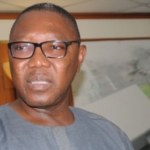
The Financial Intelligence Centre (FIC) has cleared Ghanaian businessmen Daniel McKorley, popularly known as McDan, and Richard Nii Armah-Quaye of any wrongdoing following detailed investigations into their financial transactions.
The move comes after the accounts of the two entrepreneurs were frozen as part of a wider inter-agency probe into alleged financial irregularities.
However, after months of scrutiny, the FIC has unfrozen the accounts, restoring their full access to funds.
This was confirmed by the Chief Executive Officer of the FIC, Kwadwo Twum Boafo, during an interview with Accra-based GHOne television on October 29, 2025.
He explained that the decision followed a conclusive investigation that found no evidence of criminality or financial misconduct.
“McDan’s issue has been resolved. That is why I keep saying we don’t do personal vendettas. You can speak with him… His accounts are unfrozen.
“The accounts of Richard Nii Armah-Quaye were frozen, but they have been unfrozen now because there was a determination that there was no need for it to go forward,” Ing. Boafo said.
He further clarified that both men had cooperated fully with investigators during the process, making it easier for the FIC and its partner agencies to assess the legitimacy of their business and financial activities.
“He came here, sat down with us and gave us a thorough explanation of what he does and there was no problem. Like I said, we deal with people fairly and I don’t have a personal vendetta against anyone,” he added.
The FIC boss emphasised that the Centre’s operations are not politically motivated or targeted at specific individuals but are guided strictly by evidence and due process.
He said the agency’s mandate was to protect Ghana’s financial system from abuse, not to persecute citizens or businesses.
Mr Twum Boafo stressed that such investigations form part of Ghana’s ongoing commitment to strengthening its anti-money laundering framework and promoting transparency within the financial sector.
He also urged Ghanaians to have confidence in the work of state institutions, assuring that decisions are always based on facts rather than public speculation.



